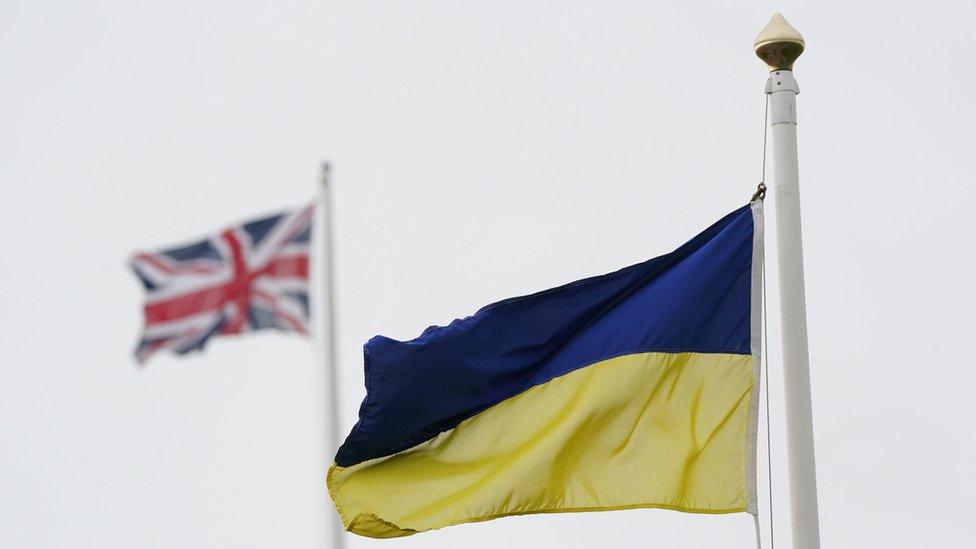Making the journey from Ukraine to south-east England
- Published
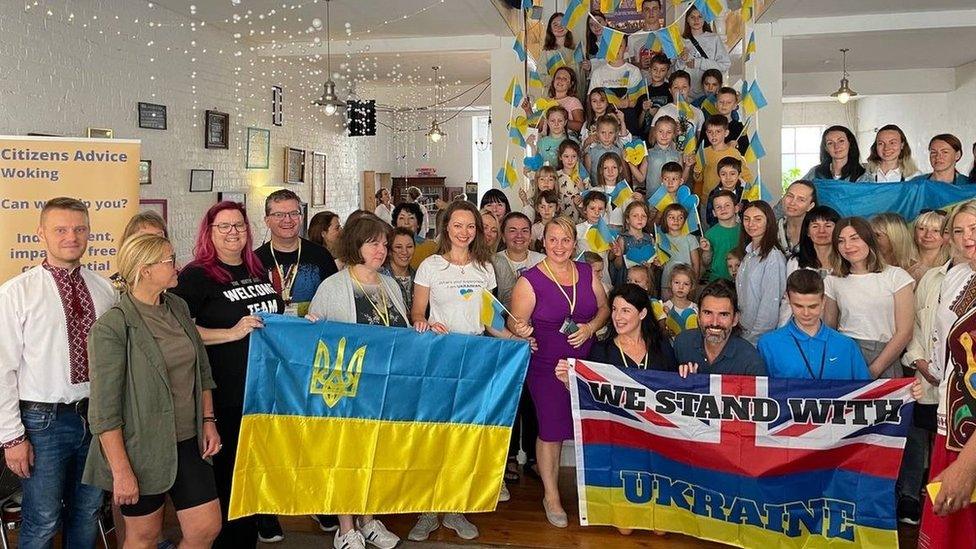
Ukraine UK unity is a volunteering organisation helping with integration
Two years after Russia invaded Ukraine, one refugee who came to the UK says many have nowhere to return to as their homes "no longer exist".
The outbreak of war forced 143,727 Ukrainians to seek refuge in the UK under the Homes for Ukraine scheme.
Iryna Tyazhkorob said it was a "five-minute decision" to come to the UK through the scheme in May 2022.
She now lives in Shoreham, West Sussex and volunteers to support other Ukrainians who have made the move.
According to the Home Office as of 20 February, Kent, East and West Sussex, and Surrey had welcomed 12,904 Ukrainians.

Volunteering in Ukraine
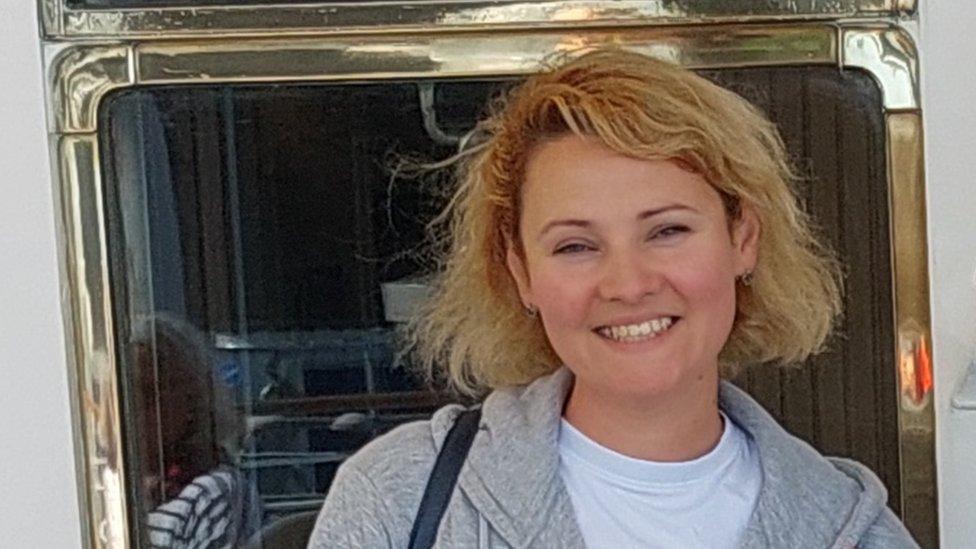
Iryna Tyazhkorob helped to found the Adur Ukraine Association
Iryna had previously done volunteering work in Ukraine, where she helped organised a shelter for over 100 people.
"For three months people lived in the shelter and two babies were born there," she said.
Once she arrived in West Sussex she naturally decided to volunteer to support other Ukrainians.
Iryna says she recognises how challenging it is for the thousands of people to integrate into a foreign country.
In the beginning Iryna said there were feelings of isolation due to the language barrier.
She said: "Ukrainians were arriving and arriving, and nobody knew what to do."
After volunteering in churches and other local organisations Iryna helped to establish the Adur Ukraine Association, external.
Promoting Ukrainian heritage and culture, the support network has focused on rallying around the Ukrainian community now living in Sussex.
On Saturday the group is remembering the anniversary at the Artisans Market near the war memorial in Shoreham.

Finding a new home
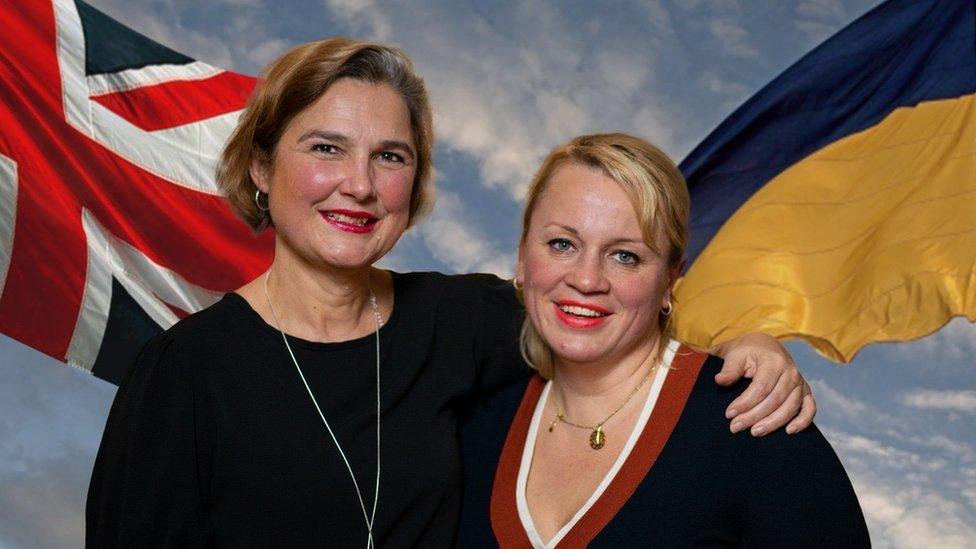
Carolyn Drury-Burroughs (right) Irina Garmash-Creeger (left)
Irina Garmash-Creeger, a Ukrainian-born Woking resident says "the community spirit is alive" in Surrey.
With the highest number of arrivals in the UK, the county has welcomed 3,952 Ukrainians.
Along with Carolyn Drury-Burroughs, Irina has played a key role in supporting the "challenging" application process for the Homes for Ukraine scheme.
Irina said as people approached her and Carolyn for help with the process they created their own system to match hosts to guests.
She explained: "I could see that people will be easily matched if they knew each other, so the solution was very simple, we started doing interviews for people looking for sponsors and people wanting to be hosts."
The pair recognised the need to consider "the human factor".
After submitting 200 applications, Irina said they lost count. "We were helping anyone we could.
"In the beginning, it was 24/7 calls and interviews every single evening. We had to consider some people were underground and couldn't make a call."
'Home away from home'
Irina and Carolyn said they became a bridge between the people in need and the people wanting to help.
Following the arrivals, Irina said: "We realised people would need support locally."
And so in June 2022 Ukraine UK Unity, external was established.
Offering English lessons, job support and a Saturday school for Ukrainian children, the hub in Woking has become known as a "home away from home" for the Ukrainian people.
In 2022 Irina's efforts were recognised by Surrey County Council when she won The Make It Happen Community Hero Award.
Irina said: "What began as a volunteering organisation at the Lighthouse in Woking, has progressed into a real community effort."

Sponsoring refugees
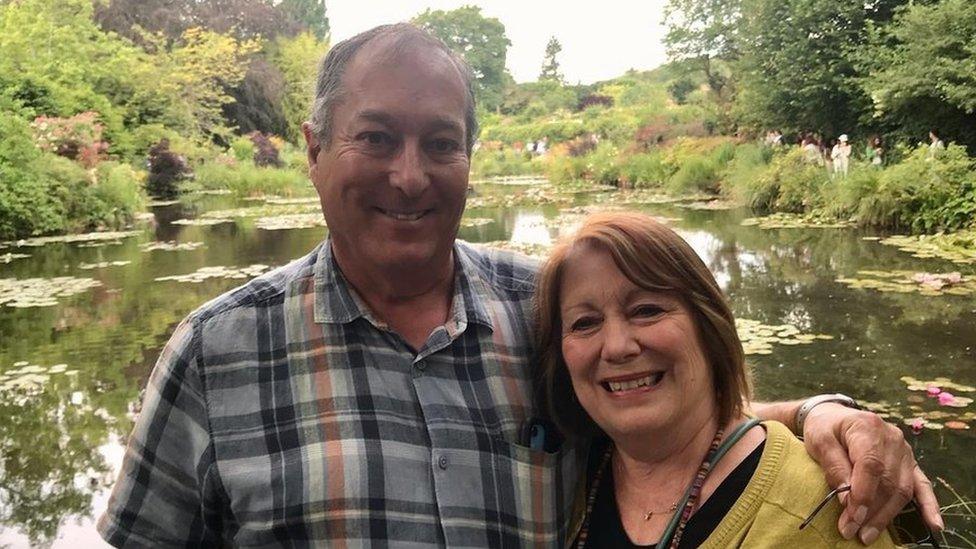
Rob and Beverly walker became sponsors in May 2022
In Guildford, Rob and Beverly Walker became sponsors after seeing the government's appeal for people with extra rooms. With their children no longer living at home they applied for the scheme.
They have been hosting Andri since May 2022 and said: "We would have him here as long as he needs to be here."
Beverly who attends the weekly meetings at the Ukraine UK Unity hub described the support in Woking as "incredible".
She said: "Irina is always willing to help even though we're not in her council, it's nice knowing someone is there."
Carolyn Drury-Burroughs said: "It was important for there to be a support network for the hosts as it's difficult to have long term guests."

Support for hosts
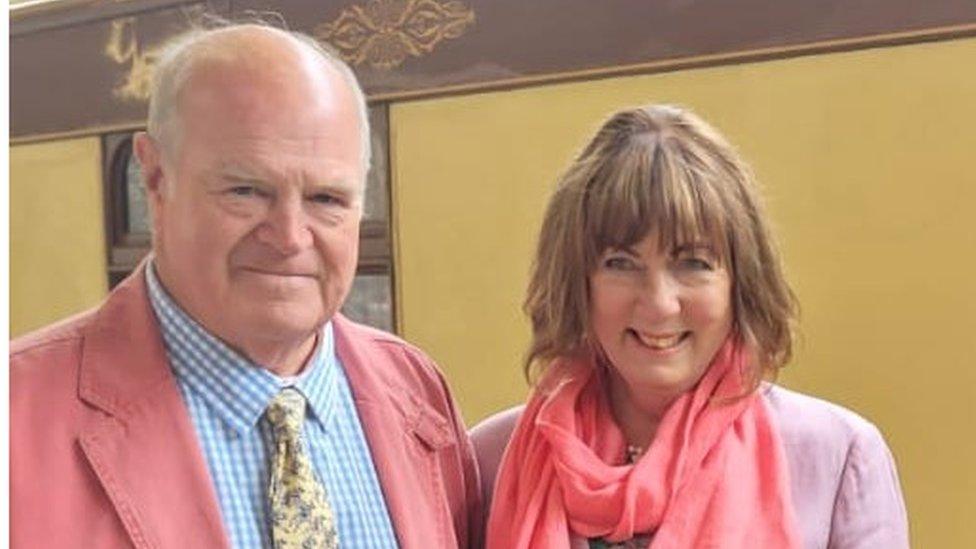
Paul and Bernadette Restorick were hosts for 18 months
In Ashford, Kent, Paul and Bernadette Restorick were sponsors to mother and daughter Oksana and Yelizaveta for 18 months.
Paul said: "Ours was one of the best success stories.
"Quite soon after they arrived we got Oksana a job in the village pub and we got Yelizaveta a full scholarship to a private school - the daughter is a gifted musician."
They have since returned to Ukraine.
Paul said the application process was "difficult", describing it as "cumbersome" for early applicants.
"We had separate accommodation to offer, we were very lucky, we got our support payment and it worked for everybody."
Paul said: "If they had stopped the payments then we would have really of started asking our Ukrainians for a contribution. Whilst we love to do good we can't just do good every month of the year for 12 months.
"The energy costs had kicked in massively, it would have been a very expensive exercise without the support we had."
Mr Restorick said they were receiving £600 per calendar month.
A spokesperson for Kent County Council (KCC) said: "Thanks to the generosity of Kent residents, central government funding and the support of our partners, including district councils, we have so far been able to help over 3800 Ukrainian guests build a life in the UK away from the war.
"Additional KCC top-up grants and Levelling Up money have eased cost-of of-living pressures on hosts and guests and helped many guests move into independent accommodation.
Mr Restorick spoke highly of both Ashford Borough Council and Kent County Council, recognising their constant support for hosts.

Living in the UK
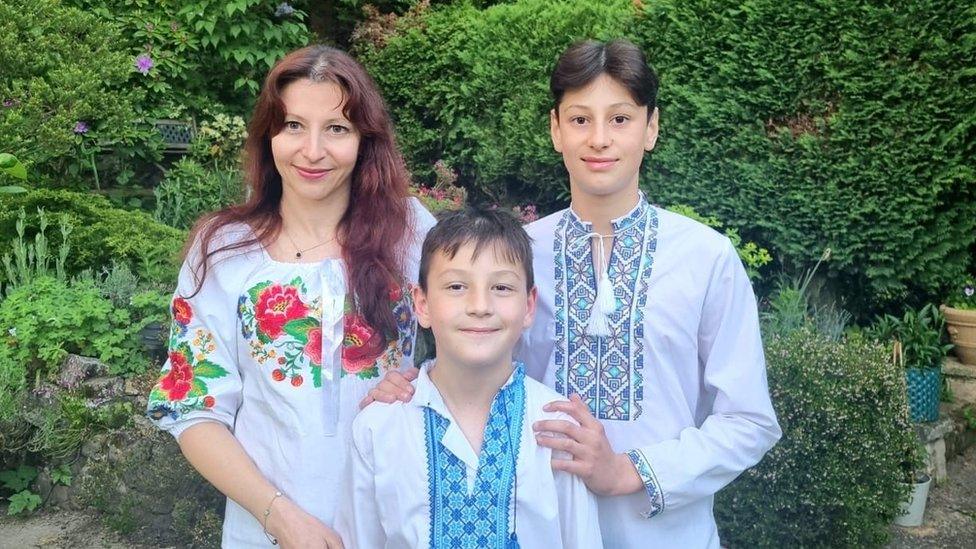
Maryna Poltavska and her sons arrived in the UK through the scheme in April 2022
Ukrainian refugee Maryna Poltavska described Kent as a "trailblazer" for the Homes for Ukraine scheme.
Maryna and her family were among the first arrivals to the UK.
She said: "My husband knew the person who was my sponsor. He got in touch with him and he expressed his readiness to be a host.
"I also had my cousin and her two children, my host couldn't host six of us so then he posted on a local WhatsApp group, and people responded ready to host."
Maryna said; "I feel so overwhelmed because I felt so much support in the community,
"I can't really express my gratitude, it was so unusual for me. These people they don't know me but they are so eager to help."
Maryna said KCC started employing staff who spoke Ukrainian, which she said made "a massive difference" both for the council and the Ukrainians guests
"The communication was more open and regular," she said.
Canterbury City Council developed a move-on pack with guidance for letting agencies about how the Homes for Ukraine scheme works and what support is available from the council.
'Living in limbo'
Maryna said at the beginning property agencies were reluctant to lease properties to Ukrainians due to their temporary visas.
She said Ukrainians had reached out to the council saying they were struggling to get the support "and they responded and developed this pack immediately".
"At the beginning [it] was [about] the basic needs of where to live and where my kids should go to school, but this is more or less settled.
"Now Ukrainians want to work and make a contribution, but many can't use their skills or qualifications here so are starting with entry level job."
She said she would like support to be extended to include retraining to recognise Ukrainians' qualifications.
"To live in that limbo is very hard, this is the second time I lost my home -the first time was in 2014 when the invasion actually started.
"I had to flee from that breakaway region and I know what it means to lose your home and leave everything behind, and I'm here again in the limbo."

What next?
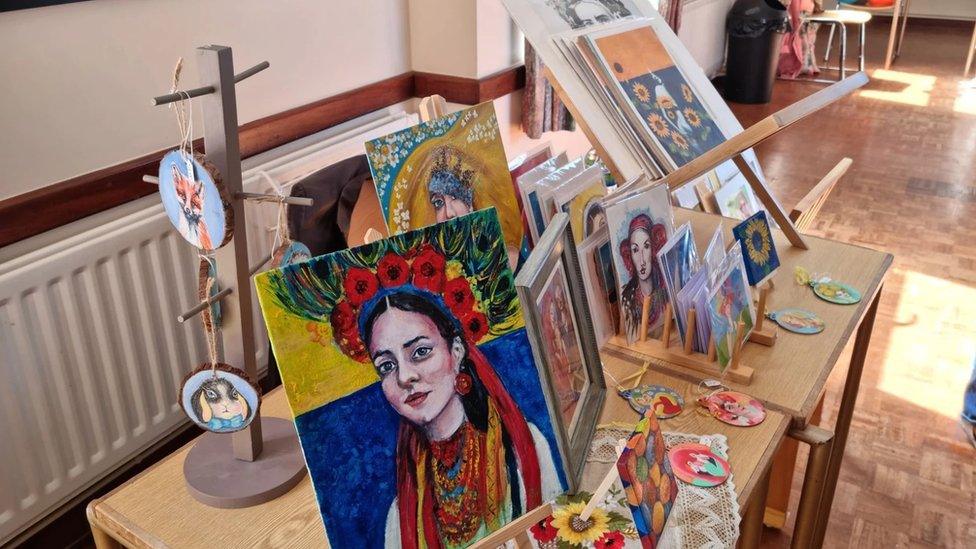
In West Sussex Adur Ukraine association celebrates the culture of Ukraine
Iryna Tyazhkorob said; "Big numbers of people have nowhere to return, physically their home does not exist."
Since her arrival, Iryna and her son have moved into in private accommodation and are now concerned about their visas.
Under the Homes for Ukrainian scheme, they were given three-year visas.
"We have a lot of young people with a high education, but employers wouldn't like to give them a space as they don't know how long they will be working with them," Iryna said.
"In one year your visa can be stopped, and what next?"
The government has now announced an option for Ukrainians to apply for an 18 month extension to their visas.
Iryna said: "We all are very happy, now we feel a bit more confidently in our future."

Follow BBC South East on Facebook, external, on X, external, and on Instagram, external. Send your story ideas to southeasttoday@bbc.co.uk, external.
Related topics
- Published23 February 2024
